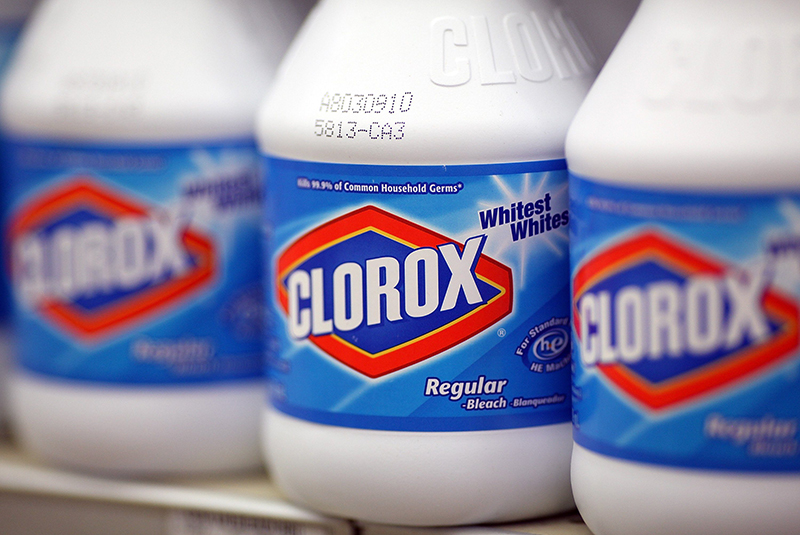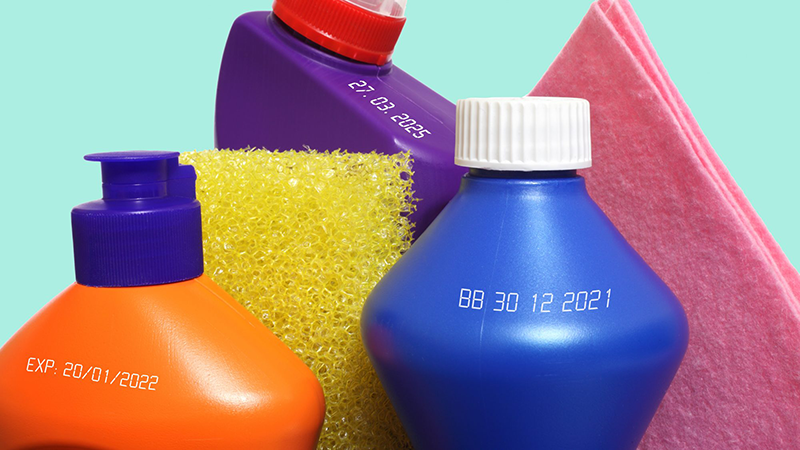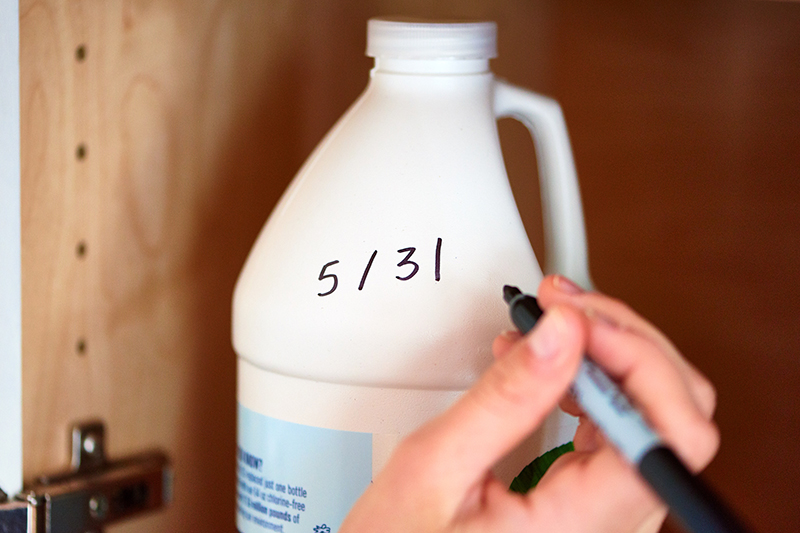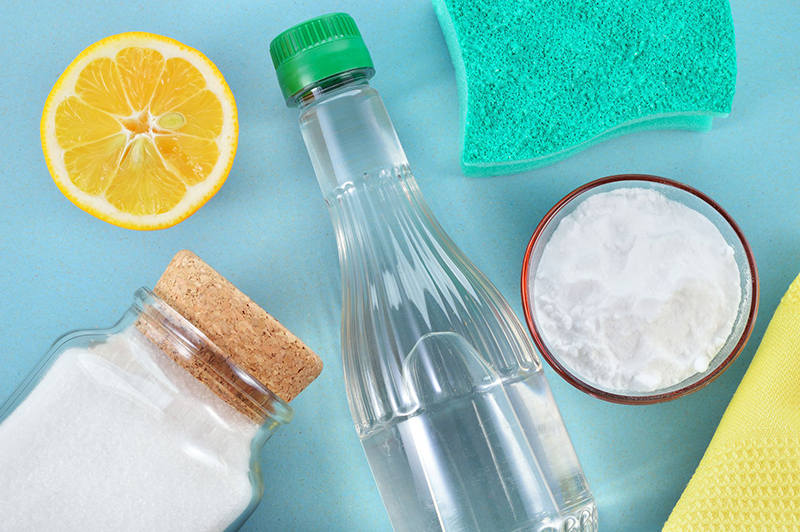What’s under your kitchen sink? And how long has it been there? Most people go through their standard household cleaners at a steady pace. But what about that bottle of Easy-Off oven cleaner, or half-used box of dishwasher cleaner? How long do cleaning products typically last? And what happens if you use outdated cleaners? Find out now!
All about cleaning products expiration dates
First things first, yes, cleaning products can and do expire. You should find the expiration date of your products printed on the package, usually near the label or on the lid or bottom. How long a product remains fresh depends on the ingredients it contains, any preservatives added, and if the container has been opened or not.
Does bleach expire?
It might be surprising to learn that bleach has such a short shelf-life. Household bleach is sodium hypochlorite, which is mixed with salt, washing soda, and lye, among other ingredients. This forms an unstable mixture that doesn’t want to stay in its bleach form for very long. Once exposed to air, the chlorine gas starts to evaporate and bleach breaks down into salt and sodium chlorate. Sodium chlorate is soluble in water, so left long enough, bleach becomes just a saltwater mixture.
Bleach breaks down at a rate of about 20% per year. That means after six months of being open, bleach has lost about 10% of its effectiveness. You can keep using bleach beyond the six-month mark, but it will only become less effective over time. Because most people use bleach to disinfect surfaces, they may think they’re getting more protection from pathogens and bacteria than they really are.
What about unopened cleaning products?
Unopened cleaning products usually last longer than opened products. That’s because they’re packaged in containers that keep them stable. However those containers aren’t perfect, so you should still keep an eye on the expiration date.
Generally speaking, liquids expire faster than solids. Powdered laundry detergent and OxiClean powder, for example, can remain stable for many years. Castile soap also has a long shelf-life, about three years.
| HOW LONG DO UNOPENED CLEANING PRODUCTS LAST? |
| Bleach |
1 year |
| All-purpose cleaning sprays |
2 years |
| Dish detergent |
12-18 months |
| Laundry detergent |
9-12 months |
| Disinfectant sprays |
2 years (1 year if antibacterial) |
| Hydrogen peroxide |
3 years |
| Ammonia |
5 years+ |
Signs that some other cleaning products have expired
How do you spot that your cleaning product has expired? Here are some handy tips.
- The product has separated
- The product has changed color or consistency (e.g. gone lumpy)
- Baking powder doesn’t fizz in hot water
- Baking soda doesn’t fizz in vinegar
- Dryer sheets lose their scent
- Hydrogen peroxide has gone flat (no fizzing when poured out)
What is the shelf life of disinfectants?
Disinfectants have different expiration dates depending on the active ingredients inside them. If a disinfectant is antibacterial, it will expire much faster than an all-purpose spray. Part of the reason for that is that all cleaning products lose effectiveness over time. While you may still get some antibacterial effects after a product has expired, you won’t get enough for it to be classed as truly antibacterial.
We can’t see microbes on surfaces, so we have to trust that the products we use to kill them really work. Expiration dates help build this trust. When a cleaning product expires, that doesn’t mean it’s dangerous or completely ineffective. It means it won’t perform to the level the consumer expects. When it comes to killing viruses and bacteria, that’s important information that the user needs to know.
Can I use an expired disinfectant?
Expired cleaning products are just less effective versions of brand new ones. You can still use expired products and they won’t cause any harm, but they won’t produce the best results. That could mean your dish or laundry soap doesn’t foam as well as you were expecting. Or it could mean your kitchen hasn’t been sanitized, even when you thought it was.
Often the fragrance in products also degrades over time. That might mean your dryer sheets still reduce static and make your clothes feel nice, but they don’t smell as good as you were expecting. The lack of scent in a product can also provide a clue that it has expired. If you don’t get the expected lemony scent from your kitchen cleaner, it’s probably past its best.
How to dispose of expired cleaning products
If you’re cleaning out your cupboards and realize half your cleaning products have expired, don’t panic. There are several ways to safely dispose of expired cleaning products.
As we’ve discovered, cleaning products don’t go bad over time, they just get less effective. You can always continue to use them for less important cleaning jobs. For example, use expired hydrogen peroxide to give your shower grout a scrub. Or make the most of expired laundry detergent by washing throws, curtains, and pillows.
Most household cleaners are safe to dispose of with your regular household trash. Check the label of your products to find out if there are any specific instructions. Some cleaners are best neutralized before being disposed of, and you can also use cat litter to absorb liquids and make them easier to throw away.
Think about how you’d get rid of the cleaner during its normal use. If the answer is it would be flushed down a drain, then you can safely do that with expired products. Consider the drain you’re using — don’t put a bottle of toilet cleaner down the kitchen sink! Also limit the amount of cleaner you throw away at once, don’t mix different cleaners when you’re disposing of them, and put large quantities of foaming cleaners such as laundry detergent into the trash, not your pipes. Otherwise you might end up with a smelly washing machine or sink to deal with.
Pro Tip: If you have a septic system, make sure your cleaners are all septic-safe before putting them down a drain.
| WHAT DO YOU DO WITH OLD CLEANING PRODUCTS? |
| Bleach |
Flush it down the toilet |
| All-purpose cleaning sprays |
Put it in the trash |
| Dish detergent |
Put it in the trash |
| Laundry detergent |
Soak up with cat litter and put it in the trash |
| Disinfectant sprays |
Put it in the trash |
| Hydrogen peroxide |
Pour it down a drain |
| Ammonia |
Soak up with cat litter and baking soda and put it in the trash |
What else affects cleaning product stability?
How you store your cleaning products matters. Even if the container is sealed, the contents can still be affected by temperature changes and exposure to light and moisture. Products designed for household use should usually be kept in a cool, dark, dry place such as under the sink.
Remember! Keep products in a place that’s:
Keeping cleaners in a damp basement or uninsulated garage or shed will often degrade the active ingredients faster. If you notice that a product has changed color or consistency — for example, separated or gone lumpy — then it’s probably gone off. Check the label, as some changes are just a result of natural settling, but if there’s no mention of the changes you observe, throw the product away.
Why do some natural cleaning products expire faster?
If you use a lot of natural or organic cleaners, you might notice the expiration dates are much shorter than the examples given in this post. That’s because those products don’t have preservatives in them to extend their shelf life.
Preservatives can keep a cleaning solution stable and prevent microbial growth that contaminates the product. This is a problem for natural cleaners because many preservatives don’t meet the manufacturer’s green criteria. Therefore it’s important to always double-check the expiration date on natural products.
Final thoughts
Most people use their cleaning products long before they’ve expired, but if you’ve found some old cleaner in your home, or you’ve bulk bought a product and didn’t use it as fast as you anticipated, you might find yourself stuck with a cleaner that’s long past its use-by date. The good news is this product isn’t harmful, but it won’t be as effective as it was when it was new.
For something like glass cleaner or dryer sheets, that’s not a big deal. But if you’re relying on the cleaning power of antimicrobial or sanitizing products, you should always check that they’re still in date. So the next time you’re doing a deep clean, have a look at the expiration of your cleaning products too!



